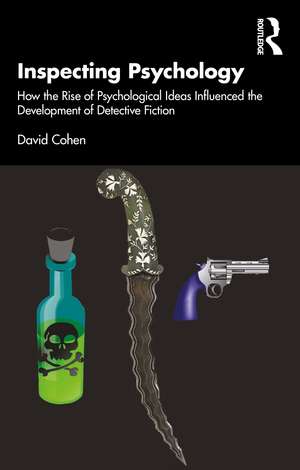Inspecting Psychology: How the Rise of Psychological Ideas Influenced the Development of Detective Fiction
Autor David Cohenen Limba Engleză Paperback – 2 noi 2021
Some key puzzles. Why did Agatha Christie make so many doctors killers in her books? Why did Simenon not become a psychiatrist? Did Lord Peter Wimsey have all the charm, passion and tenderness no lover gave Dorothy Sayers?
Beginning with the earliest origins of psychology in Greek literature alongside the Oedipal story and the ideas of Aristotle, the book travels through to the late 18th and 19th centuries and the work of Edgar Allan Poe who wrote the first detective story proper. With the birth of modern psychology in the late 19th century, the growing fascination with understanding behaviour coincided with the popular whodunnit. Readers are whisked through the development of psychology in the 20th century and beyond, from the impact of shell shock in the First World War and the early understanding of mental illness through to the growth of psychoanalysis and the ideas of Freud, behaviourism and attachment theory. At every stop on this original rattle through history, David Cohen reveals the influence these psychological movements had on crime writers and their characters and plots.
The result is a highly enjoyable, engaging read for those interested in how the unique pairing of the history of psychology with the history of the detective novel can unveil insights into the human condition. It should appeal to anyone interested in psychology who wants their subject served with a thriller on the side.
| Toate formatele și edițiile | Preț | Express |
|---|---|---|
| Paperback (1) | 187.83 lei 6-8 săpt. | |
| Taylor & Francis – 2 noi 2021 | 187.83 lei 6-8 săpt. | |
| Hardback (1) | 887.43 lei 6-8 săpt. | |
| Taylor & Francis – 2 noi 2021 | 887.43 lei 6-8 săpt. |
Preț: 187.83 lei
Nou
Puncte Express: 282
Preț estimativ în valută:
35.94€ • 37.66$ • 29.71£
35.94€ • 37.66$ • 29.71£
Carte tipărită la comandă
Livrare economică 11-25 aprilie
Preluare comenzi: 021 569.72.76
Specificații
ISBN-13: 9780367362188
ISBN-10: 036736218X
Pagini: 166
Dimensiuni: 138 x 216 x 9 mm
Greutate: 0.21 kg
Ediția:1
Editura: Taylor & Francis
Colecția Routledge
Locul publicării:Oxford, United Kingdom
ISBN-10: 036736218X
Pagini: 166
Dimensiuni: 138 x 216 x 9 mm
Greutate: 0.21 kg
Ediția:1
Editura: Taylor & Francis
Colecția Routledge
Locul publicării:Oxford, United Kingdom
Notă biografică
David Cohen got his Ph.D. on what makes children laugh. His latest books are Churchill and Attlee: The Unlikely Allies Who Won the War and Surviving Lockdown: Human Nature in Social Isolation, which was written in a hurry when we thought the pandemic would soon be over. If only. He is also a film-maker. His ITV film on the Soham murders was nominated for the Baftas. He produced London Unplugged, ten short films about London, and is planning to make a feature film based on his book The Escape of Sigmund Freud, the story of how Freud got out of Vienna in 1938.
Cuprins
1. The first psychologies: from rock art to the association of ideas 2. Psychology, phrenology and psychiatry: the late 18th-19th centuries and the work of Edgar Allen Poe 3. The birth of modern psychology: 1879 and the significance of apparently unconnected events 4. Psychology and mystical experiences: the late 19th century and the work of William James and Conan Doyle, allies in the mystical 5. Puzzles, riddles and Gestalt theory: the early 20th century and the work of G.K. Chesterton 6. The First World War, mental illness and shell shock: the work of Rebecca West and the detective novels of the 1920s. 7. Freud, psychoanalysis and the psychology of Agatha Christie: the golden age of detective fiction 8. Individual psychology and the inferiority complex: Lord Peter Wimsey and the work of Dorothy Sayers 9. Theories of learning and the rise of behaviourism: the 1920s and the work of Anthony Berkeley, the innovator who seized up 10. Attachment theory and the work of John Bowlby: psychology between 1930 and 1945 and the novels of Gladys Mitchell 11. Psychoanalysis and psychiatry from 1930 to 1960: Georges Simenon and the intellectual egos of Sartre and Lacan 12. Curtains: contemporary psychology, pathology porn and the enduring link with detective fiction
Descriere
Inspecting Psychology takes a sleuth’s magnifying glass to the interplay between psychology, psychiatry and detective fiction to provide a unique examination of the history of psychology.
